Understanding Funeral Home Refrigeration Systems
A funeral home refrigerator is specialized cooling equipment designed to preserve human remains by maintaining temperatures between 2°C and 4°C (36°F to 39°F). If you're looking for information about funeral home refrigerators, here's what you need to know:
- Purpose: Delay decomposition and maintain dignity of the deceased
- Preservation time: Up to 7 days before additional preservation methods needed
- Temperature range: 2-6°C (35-43°F), typically 2-4°C (36-39°F)
- Types: Walk-in coolers, cabinet-style units, roll-in refrigerators
- Capacity options: Single-body to 50+ body units
- Cost range: $5,799 for single-body units to $32,995 for larger systems
- Daily storage fees: Typically $35-$100 charged by funeral homes
In the funeral service industry, proper refrigeration is not just a regulatory requirement—it's an essential component of dignified care. Funeral home refrigerators serve as temporary preservation solutions when immediate embalming isn't possible or desired. Unlike standard commercial refrigerators, mortuary units are specifically designed with features like stainless steel construction, specialized body trays, and precise temperature controls to ensure optimal preservation.
"A mortuary is used for storing the deceased that are awaiting identification, burial/cremation and removal for autopsy," explains one industry source, highlighting the critical role these systems play in modern funeral service operations.
I'm Mortuary Cooler, a national-level supplier of mortuary refrigeration systems with extensive experience designing and installing funeral home refrigerator solutions across the country. Having worked with facilities of all sizes, I've helped funeral directors steer the complex considerations of refrigeration system selection and implementation.
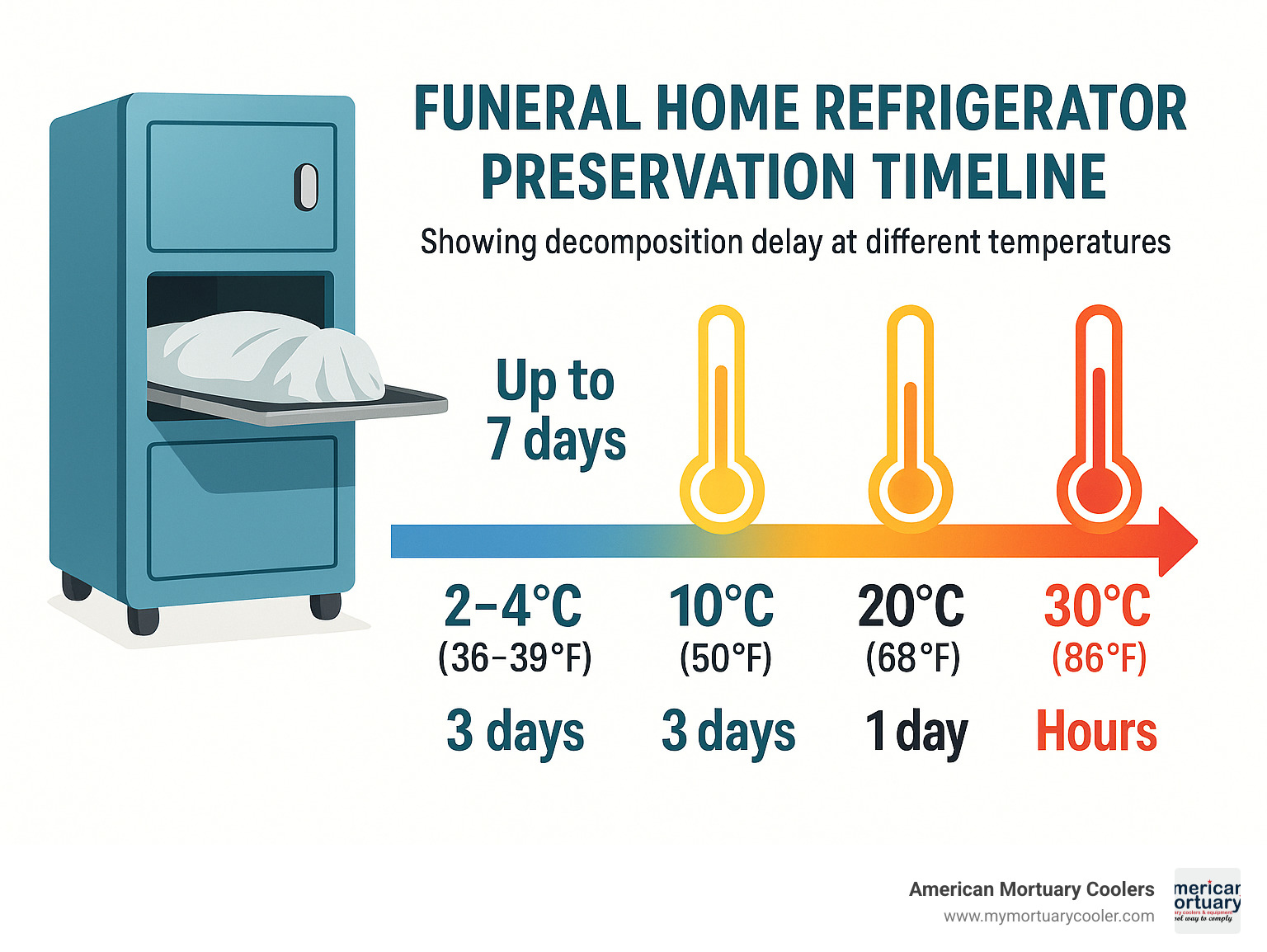
Simple Funeral home refrigerator glossary:
Funeral Home Refrigerator 101: Purpose, Types & Anatomy
When I first started at American Mortuary Coolers, I was amazed by how much thought goes into these specialized systems. The modern funeral home refrigerator isn't just a big cold box – it's a carefully engineered environment that preserves dignity while nature takes its pause. After helping hundreds of funeral directors set up their cooling systems, I've come to appreciate the perfect balance of technology and respect these units represent.
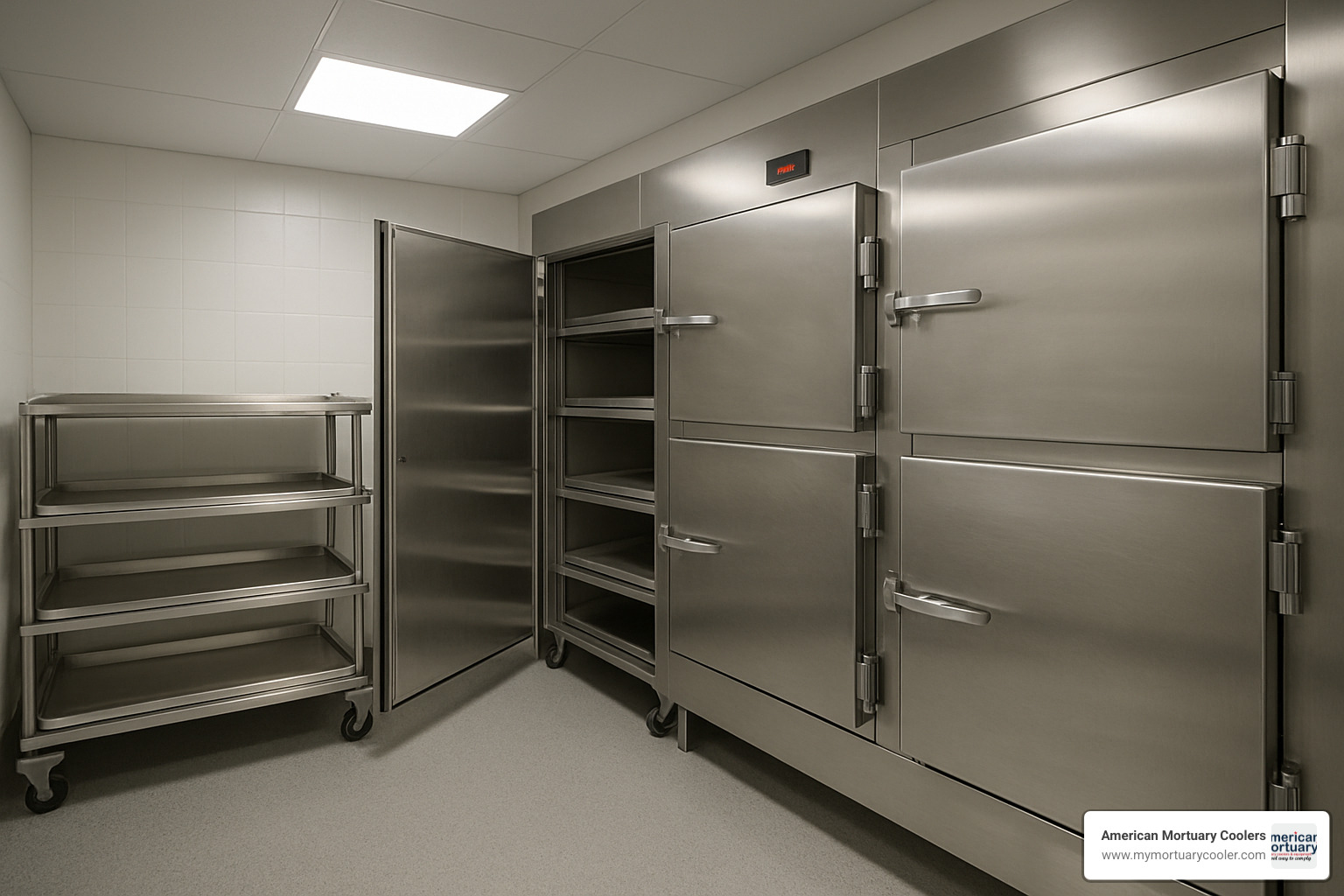
What Is a Funeral Home Refrigerator?
Simply put, a funeral home refrigerator is specialized equipment designed to temporarily preserve human remains. These aren't your kitchen fridges with a few modifications – they're purpose-built systems that maintain a steady temperature between 2°C and 4°C (36°F to 39°F).
Think of them as creating a dignified pause button. When families need time to gather, when immediate embalming isn't possible, or when medical examiners need to complete their work, these systems provide that crucial window of time. They slow bacterial growth and tissue changes while maintaining the condition of the deceased.
What makes them special is their singular focus on creating the perfect environment for this delicate task. Every component, from the gaskets to the compressor, is selected to maintain that ideal temperature range that respects both the needs of the living and the dignity of those who have passed.
Positive vs. Negative Temperature Units
In my years helping funeral homes choose the right equipment, I've found that understanding temperature options is often confusing for newcomers to the profession. Let me break it down simply:
Positive Temperature Units keep things cool but not frozen, typically between 2°C and 4°C. These are what you'll find in most funeral homes. They're like your home refrigerator – cold enough to slow natural processes but not freezing. They use less electricity, are gentler on tissues, and work perfectly for the typical timeframe needed between death and services (up to about a week). When I visit most funeral homes, this is what they're using day-to-day.
Negative Temperature Units are the deep freezers of our world, running between -10°C and -50°C. They're much less common in standard funeral homes and more frequently found in medical examiner offices or forensic facilities. While they dramatically slow decomposition for extended periods, they use significantly more energy and can actually complicate embalming later on due to the way freezing affects tissues.
I often tell new funeral directors, "Think of positive units as pressing pause, and negative units as pressing stop – but remember that stop makes it harder to press play again when it's time for preparation."
If you're curious about freezer systems and their specialized applications, take a look at our more detailed guide about body freezers.
Design Styles: Walk-In, Cabinet, Roll-In & Portable
The funeral home refrigerator comes in several designs, each serving different needs and spaces. After installing hundreds of units, I've seen how the right choice depends on your facility's unique requirements.
Walk-In Coolers are the workhorses of high-volume operations. Built from thick insulated panels (usually 4 inches of polyurethane foam sandwiched between stainless steel), these rooms can hold anywhere from 5 to 50+ deceased. They feature interior lighting, safety releases (so nobody gets accidentally locked in), and rack systems for organized storage. Prices typically start around $13,995 for a standard 10'×10' unit. These are perfect for hospitals, medical examiners, and larger funeral homes.
Cabinet-Style Units remind me of upright filing cabinets but engineered for preservation. They store between 2 and 15 deceased in a compact footprint, often with multiple tiers. They feature digital temperature displays and secure locking systems. For mid-sized operations with space constraints, these units (ranging from $6,445 to $32,995) offer an excellent balance of capacity and footprint.
Roll-In Refrigerators are all about convenience and back-saving design. They accommodate gurneys or wheeled trays for easy transfer without lifting. With wide doors and often a small ramp, they minimize staff strain while maintaining proper cooling. Single-body units start around $5,799, making them great for smaller facilities or as backup systems.
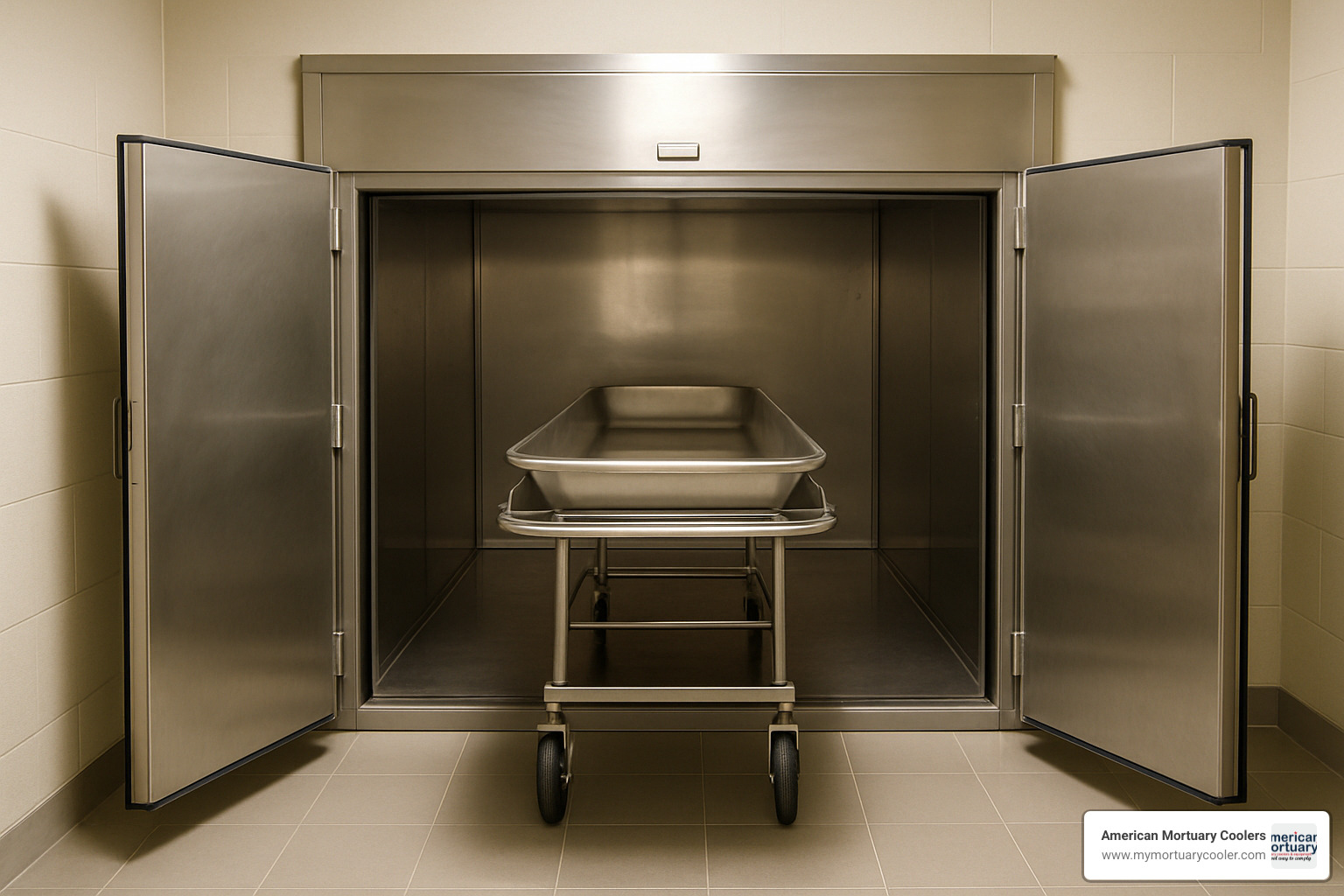
Portable Solutions have become increasingly important in our disaster-ready world. These temporary systems can be quickly deployed when needed – whether during renovations, after natural disasters, or during unexpected capacity surges. Rather than purchasing these outright, many facilities rent them as needed.
I've noticed more funeral homes choosing modular designs lately. As one director told me, "I can start with what I need today, but easily expand tomorrow." This flexibility is particularly valuable in growing communities or facilities with seasonal fluctuations.
Specialized options have evolved too. For communities with higher obesity rates, bariatric-capable units ensure dignified care for larger individuals. Telescoping rail systems have been a game-changer for staff safety, reducing lifting injuries while providing easier access for preparation.
Human-centered design touches like these remind me that while we're talking about refrigeration technology, we're ultimately discussing systems that honor both the deceased and those who care for them.
Temperature Control & Preservation Science
The science behind funeral home refrigerators isn't just about keeping things cold—it's a careful balancing act that respects the dignity of those who have passed while giving families the time they need to say goodbye properly.
Recommended Temperature & Humidity Ranges
When it comes to funeral home refrigerators, precision matters more than you might think. The sweet spot for preservation is between 2°C and 6°C (35°F to 43°F), though most professionals aim for the narrower range of 2°C to 4°C (36°F to 39°F). This isn't arbitrary—it's the temperature zone where decomposition slows significantly without freezing tissues.
Preparation rooms where embalmers work typically stay warmer at 15°C to 18°C (59°F to 64°F), creating a more comfortable environment for staff while still maintaining dignity for the deceased.
Humidity plays an equally important role, with about 85% being ideal. Too dry, and tissues begin to dehydrate unnaturally; too humid, and you're creating a paradise for bacterial growth. Modern units monitor both factors constantly, with alerts that sound when conditions drift outside safe parameters.
"Getting the environment just right is everything," explains one of our longtime customers. "Too cold damages tissues for embalming, too warm speeds decomposition. There's not much room for error."
Today's digital monitoring systems offer peace of mind through high/low temperature alarms, remote Wi-Fi monitoring, and automatic data logging that helps funeral homes stay compliant with regulations. Many of our units come ready for backup power connections—because dignity doesn't take a break during power outages.
For those interested in diving deeper into the science, the latest research on mortuary room standards offers fascinating insights into this specialized field.
How Long Can a Body Be Refrigerated?
When families ask about timing, it's important to understand the preservation timeline. The cooling process itself takes about 24 hours as the body's core temperature gradually drops. Once properly cooled, refrigeration typically preserves remains for up to 7 days before other preservation methods become necessary.
This timeline shapes everything from family planning to facility operations. As one funeral director shared with us, "That 7-day window gives families breathing room to gather from across the country, but we're always mindful of the clock."
Several factors influence how long preservation remains effective:
- How much time passed before refrigeration began
- The person's condition at the time of refrigeration
- How stable the temperature remains
- Individual biological factors that vary from person to person
It's worth noting that many funeral homes charge daily storage fees ranging from $35 to $100, reflecting both operational costs and the limited capacity of their facilities. For families concerned about these expenses, reviewing storage fee information can help with planning.
Materials & Hygiene Safeguards
The materials used in funeral home refrigerators tell a story of respect through design. The shining stainless steel you'll see isn't just for looks—it's one of the most hygienic, easy-to-sanitize materials available.
The exterior typically features stainless steel or stucco-embossed aluminum that stands up to years of use, while interiors use corrosion-resistant stainless steel that can withstand frequent cleaning and disinfection. Between these layers sits high-density polyurethane foam insulation (usually 60-80mm thick) that maintains temperature while keeping energy costs reasonable.
Modern units often include thoughtful details like seamless interior construction that prevents bacteria from finding hiding places, removable body trays for thorough cleaning, and proper drainage systems. Many now feature SmartProtec® or similar antimicrobial treatments that actively fight bacterial growth on surfaces.
The floors deserve special mention—they're reinforced to handle the weight of multiple remains and designed with subtle slopes toward drains for easy cleaning. Even the gaskets (those rubber seals around the doors) are medical-grade and antimicrobial, showing how every detail matters in this industry.
"In our Tennessee workshop, we obsess over these details," our lead fabricator often says. "Because at the end of the day, we're creating a space that honors someone's loved one during a difficult transition."
Sizing, Installation & Cost Considerations
When it comes to choosing the right funeral home refrigerator for your facility, finding the perfect balance between space, capacity, and budget is essential. At American Mortuary Coolers, we've helped hundreds of funeral directors steer these important decisions.
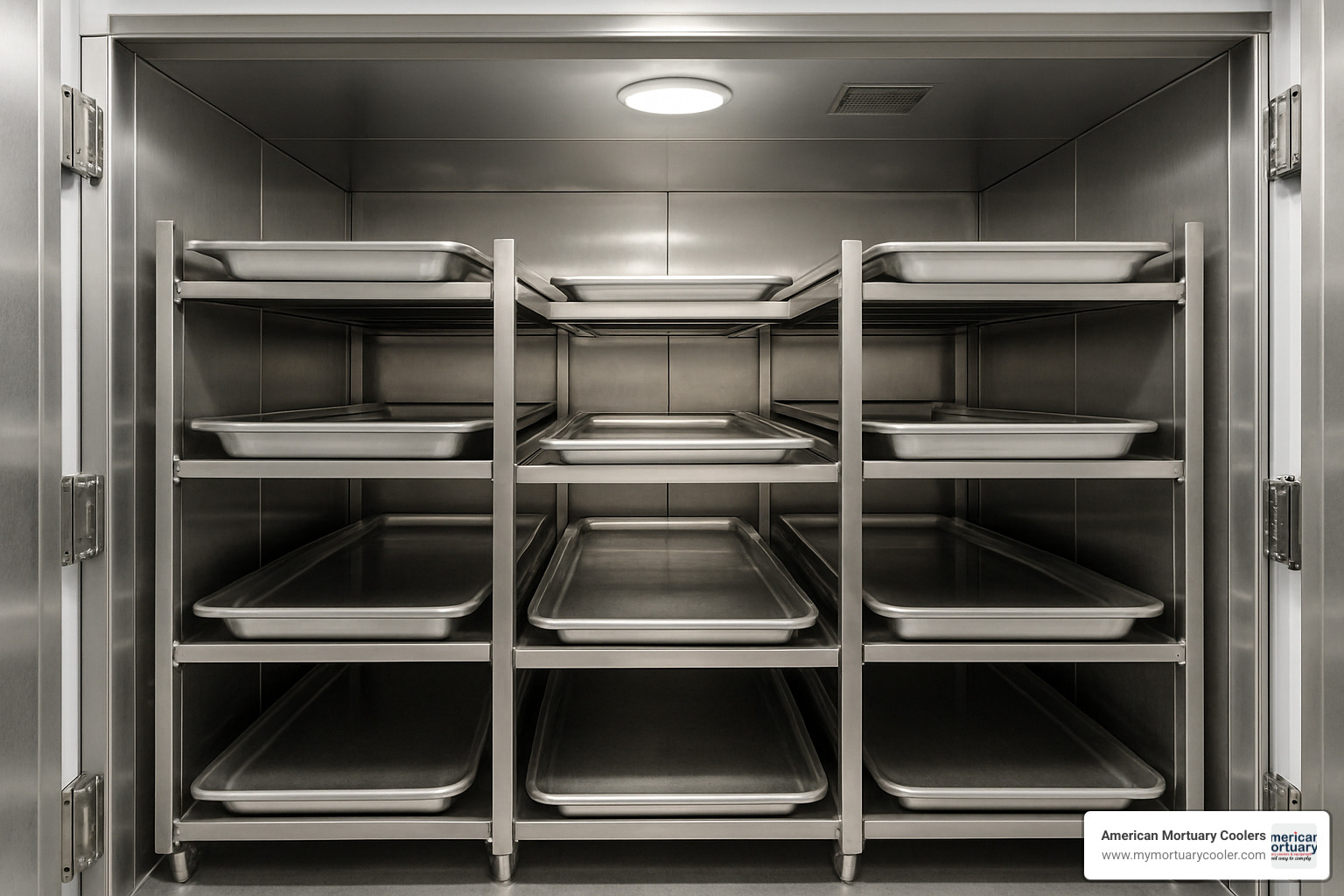
Comparing Upright, Roll-In & Walk-In Models
Selecting the right model type can feel overwhelming, but understanding the key differences helps simplify your decision:
| Model Type | Typical Dimensions | Body Capacity | Price Range | Installation Time | Floor Load Requirements |
|---|---|---|---|---|---|
| Single-Body Roll-In | 3'×3'×6' | 1 | $5,799-$6,500 | 1-2 hours | Standard |
| 2-Body Upright | 3'×3'×6' | 2 | $6,445-$8,500 | 2-3 hours | Standard |
| 3-Body w/Roller Shelves | 8'×3'×6' | 3 | $9,500-$12,000 | 3-4 hours | Reinforced |
| 6-Body 2-Door | 6'×6'×6' | 6 | $15,000-$22,000 | 4-6 hours | Reinforced |
| 8-Body Telescoping | 8'×6'×6' | 8 | $28,000-$32,995 | 6-8 hours | Heavily Reinforced |
| Walk-In (10'×10') | 10'×10'×8' | 10-20 | $13,995-$25,000 | 1-2 days | Structural Assessment |
I've found that most mid-sized funeral homes typically start with a standard 3-body unit, which offers a good balance of capacity and footprint. As one of our Johnson City clients recently told me, "We didn't realize how much flexibility the right-sized cooler would give our scheduling until we had one."
When planning your purchase, take time to consider your actual needs. Think about your current case volume, available floor space, doorway access for installation, and whether your floor can support the weight of larger multi-body units. Don't forget to check your electrical service too – most units require a dedicated 220V circuit.
Installation & Maintenance Checklist
Getting your funeral home refrigerator properly installed and maintained isn't just about performance – it's about peace of mind.
Before your unit arrives, you'll need to prepare your space. This means ensuring you have a level surface (slightly sloped for drainage is ideal), proper ventilation around the unit, and appropriate electrical connections. For larger units, you'll need a floor drain for condensate removal – something many funeral homes overlook until installation day.
Once your cooler is up and running, maintaining it properly will extend its life significantly. A simple routine makes all the difference:
Daily temperature checks take just minutes but can prevent costly failures. Weekly interior cleaning with approved disinfectants helps maintain hygienic conditions. Monthly, take time to inspect those gaskets – they're the unsung heroes of temperature stability. Quarterly, have someone clean those condenser coils and check the condensate system. And annually, invest in a professional inspection by a certified technician.
As Tom, a funeral director from Atlanta, shared with me, "Setting up a maintenance calendar on my phone was the best thing I ever did for our equipment. We haven't had a single emergency service call in three years."
For more comprehensive guidance on equipment decisions, take a look at our guide about buying funeral home equipment.
Operating Costs & ROI
Understanding the true cost of owning a funeral home refrigerator goes beyond the purchase price. Let's talk about what you can expect financially.
The electricity costs for running your unit will typically range from $50-$150 monthly, depending on size and efficiency. Modern units with digital thermostats and high-efficiency compressors can cut energy use by 15-30% compared to older models – something worth considering if you're replacing aging equipment.
Regular maintenance runs about $500-$1,500 annually, but this investment prevents more costly emergency repairs down the road. Speaking of repairs, it's wise to budget about 5-10% of your purchase price annually once the warranty period ends.
On the revenue side, the flexibility a good refrigeration system provides is invaluable. Many facilities charge storage fees ranging from $35-$100 per day per body, which can help offset operating costs. But the real value often comes in operational flexibility – the ability to schedule services optimally for families and staff, defer embalming when appropriate, and maintain a competitive edge in your market.
One of our Chicago customers put it perfectly: "Our cooler doesn't just store bodies – it gives us breathing room to serve families better. That's worth every penny we spent on it."
At American Mortuary Coolers, we're proud to craft our units in Tennessee with durability in mind, which means lower lifetime costs and fewer headaches for you. We understand that a refrigeration unit is more than equipment – it's an essential tool that helps you provide dignified care every day.
Tech Innovations & Best Practices
The world of funeral home refrigerator technology has come a long way in recent years. What was once basic cooling equipment has evolved into sophisticated systems that offer precision, efficiency, and peace of mind for funeral professionals.
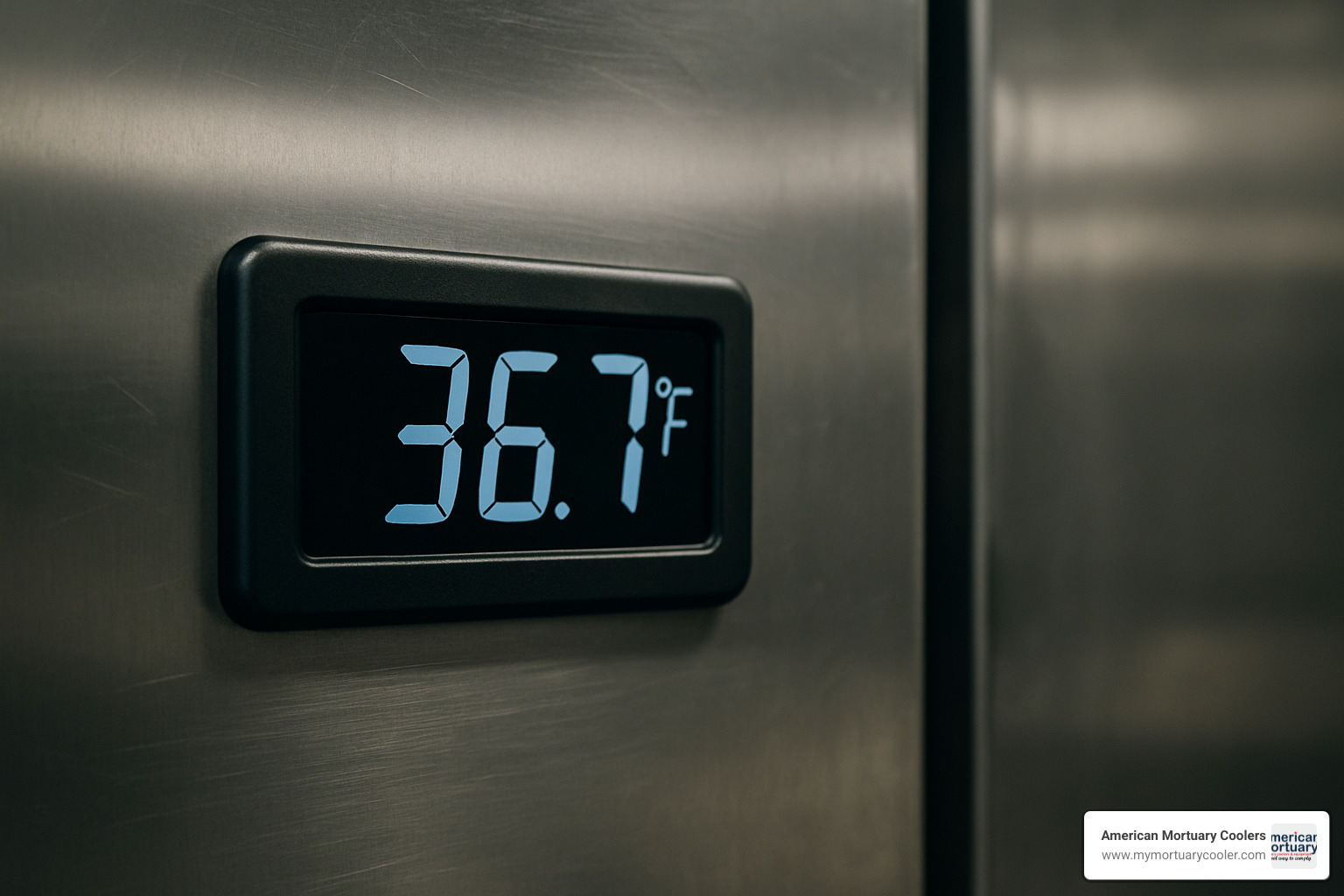
Smart Monitoring & Alarm Systems
Remember the days of manually checking temperatures and hoping nothing went wrong overnight? Those days are thankfully behind us. Today's funeral home refrigerators offer smart features that transform how we monitor and maintain these essential systems.
Modern units now come equipped with Wi-Fi-enabled sensors that constantly track temperatures and send data to cloud-based dashboards. This means funeral directors can check on their refrigeration systems from anywhere – whether at home having dinner or away at a conference.
"Get CoolBot Pro Temperature Alerts via WiFi," as one manufacturer proudly advertises – and for good reason. These alerts can be life-savers (or at least reputation-savers). When temperatures drift outside acceptable ranges, the system immediately sends SMS or email notifications, allowing staff to address issues before they become emergencies.
This technology is especially valuable for smaller funeral homes where someone isn't always on-site. Imagine the peace of mind knowing you'll be alerted at the first sign of trouble, rather than finding a problem too late. Plus, these systems maintain 30-day temperature logs, which helps with both troubleshooting and regulatory compliance.
Battery backups for alarm systems ensure that even during power outages – when refrigeration is most vulnerable – you'll still receive alerts. Some advanced systems even integrate with broader facility management software, helping funeral homes shift from reactive repairs to predictive maintenance.
If you're operating in regions with specific regulatory requirements, it's worth checking more info about coolers standards in Las Vegas as an example of how local regulations might impact your technology choices.
Modular & Portable Solutions
Flexibility has become a key consideration in the funeral home refrigerator market. Not every facility has the same needs, and those needs can change quickly.
Panelized walk-in rooms represent one of the most practical innovations in recent years. These systems allow funeral homes to start with a modest capacity and easily expand by adding panels as their business grows. No need to replace an entire system or undergo major construction – just add what you need when you need it.
For temporary needs, portable AirCool pop-up mortuary storage offers a practical solution. "Portable pop-up mortuary storage (AirCool) offers rental flexibility," as industry reports note. These units can be deployed quickly and returned when no longer needed – perfect for facility renovations or seasonal capacity fluctuations.
The disaster response capabilities of these flexible systems shouldn't be overlooked either. In times of crisis or mass casualty events, communities need to quickly expand their capacity for dignified care of the deceased. Modular and portable refrigeration systems can be deployed rapidly to meet these challenging circumstances.
We've also seen growing interest in specialized units for specific needs. Bariatric-capable refrigeration, for instance, addresses the practical reality that standard-sized units don't accommodate all bodies comfortably. Having flexible options ensures that every person can be treated with dignity, regardless of size.
At American Mortuary Coolers, we've noticed that many funeral homes appreciate the financial flexibility these modular systems provide. Rather than making a massive upfront investment in capacity they might not yet need, they can start with what's appropriate now and grow their refrigeration capabilities alongside their business.
Choosing the Right Funeral Home Refrigerator
Finding the perfect funeral home refrigerator isn't just about buying equipment—it's about making a thoughtful investment in your facility's ability to serve families with dignity and care. After helping hundreds of funeral homes across the country, I've seen how the right choice can make all the difference.
Step-by-Step Selection Guide for a Funeral Home Refrigerator
Let's walk through this decision together, just as I would if we were chatting in your prep room.
First, take an honest look at your capacity needs. How many cases do you typically handle monthly? Do you experience seasonal surges? I worked with a funeral home in Georgia that thought a 3-body unit would suffice, but after reviewing their holiday season volume, we realized a 6-body system would prevent potential overflow issues. Think about where you want your business to be in five years, not just where it is today.
Temperature requirements come next. Most funeral homes need standard positive cooling (2-4°C), but if you handle forensic cases or serve as a county morgue, you might need negative temperature capabilities. One director in Chicago opted for a dual-zone unit that gave him flexibility for different preservation needs—smart thinking that saved him from purchasing two separate systems.
Space constraints are practical realities we all face. I remember visiting a historic funeral home in Boston where we had to get creative with a custom-built unit that fit their narrow Victorian hallways. Measure your available space carefully, including doorways anything needs to pass through during installation. Don't forget about floor strength—a fully loaded multi-body unit can weigh considerably more than standard furniture.
Construction quality matters tremendously in this industry. I've seen budget units fail within years while premium systems serve faithfully for decades. Look for stainless steel interiors (not aluminum), thick polyurethane insulation (at least 60mm), and heavy-duty hardware designed for constant use. Those rubber door gaskets might seem like a small detail, but they're your first line of defense against temperature fluctuation.
Always verify regulatory compliance before purchasing. Your unit should carry UL electrical safety listing and meet local health department requirements. I once worked with a funeral home that had to replace a recently purchased unit because it lacked the certifications their county inspector required—an expensive lesson in doing homework first.
Finally, consider maintenance realities. Who will service this equipment when needed? Parts availability can make or break your operation during a critical failure. One of our clients in rural Montana wisely chose a unit with commonly available components after learning their previous European-made cooler required parts shipped from overseas with 8-week lead times.
"You're not just buying a box that keeps things cold," as one veteran funeral director told me. "You're investing in peace of mind during one of the most sensitive parts of your service to families."
Vendor Comparison & Customization Options
When comparing funeral home refrigerator suppliers, consider the manufacturing origin carefully. American-made units like ours at American Mortuary Coolers typically offer faster lead times—usually 4-8 weeks compared to 12-16 weeks for imported models. This can be crucial when you're expanding or replacing failed equipment.
The slide rail versus roller shelf debate is worth considering based on your staff's preferences. Roller shelves offer easier loading but take up slightly more space, while slide rails provide a more secure position but require more strength to operate. During a recent installation in Florida, the funeral director chose roller shelves specifically because his aging staff found them easier on their backs.
Financing options vary widely between vendors. Some offer attractive lease programs that preserve capital, while others provide better long-term value through direct purchase. We've structured flexible payment plans for many growing funeral homes that needed quality equipment but also needed to manage cash flow carefully.
Don't overlook the importance of local service availability. A beautiful refrigerator with no technician within 200 miles becomes a major liability when issues arise. I'll never forget the frantic call from a director in rural Tennessee whose imported cooler failed during a summer heat wave—with no service available for days. Our local tech was there within hours.
At American Mortuary Coolers, we believe that customization shouldn't be an expensive luxury—it should be standard practice. Our Tennessee-built systems are crafted to match your exact requirements, whether that's fitting an awkward space or accommodating special workflow needs.
For those considering larger walk-in solutions for their facilities, I recommend reviewing our more info about walk-in mortuary coolers to understand the full range of options available.
The right funeral home refrigerator isn't just equipment—it's a partner in providing dignified care that families will remember for years to come.
Frequently Asked Questions about Funeral Home Refrigerators
How does refrigeration impact embalming and service scheduling?
When families lose a loved one, timing becomes a delicate concern. Funeral home refrigerators create valuable flexibility that benefits both families and funeral professionals alike.
Refrigeration doesn't just preserve remains—it preserves options. For families needing time to gather from distant locations or those carefully considering their choices, proper refrigeration extends the planning window by 5-7 days. This breathing room can be invaluable during an emotional time.
From the embalming perspective, refrigeration creates interesting dynamics. While it wonderfully slows decomposition, bodies kept cold for more than three days present unique challenges. The tissues absorb embalming fluids differently when chilled, requiring experienced embalmers to adjust their techniques accordingly. Many funeral directors will allow bodies to gradually warm before embalming to improve fluid distribution.
"Bodies stored under refrigeration may not require embalming," as one of our industry colleagues often notes. This creates meaningful alternatives for families who prefer natural burial or direct cremation without embalming—options increasingly important to many families today.
Perhaps most practically, funeral home refrigerators help manage the logistics of services. They allow funeral homes to accommodate clergy schedules, venue availability, and those inevitable times when multiple services must be coordinated during busy periods. This behind-the-scenes flexibility ultimately translates to more personalized experiences for grieving families.
Do funeral home refrigerators require special health-department permits?
The regulatory landscape for funeral home refrigerators resembles a patchwork quilt—each jurisdiction has its own distinct pattern of requirements. This variability can be challenging, but understanding the common threads helps funeral professionals steer compliance.
Most health departments require some form of inspection and approval before a new refrigeration unit can be placed into service. These inspections typically verify proper installation, temperature control capabilities, and sanitation standards. Many jurisdictions also require funeral homes to maintain detailed temperature logs and have written procedures for handling temperature fluctuations.
The regulatory oversight tends to intensify in urban areas and for facilities that handle infectious cases. Some health departments require separate permits specifically for negative-temperature units or those designated for high-risk remains.
At American Mortuary Coolers, we've steerd these regulatory waters across all 48 contiguous states. We work closely with local authorities to ensure our installations meet or exceed applicable standards, taking one more worry off your plate. Our team can often anticipate regulatory requirements you might not even be aware of, helping prevent compliance headaches before they begin.
What backup systems protect against power outages?
In the funeral profession, power outages aren't just inconvenient—they're potentially catastrophic. That's why thoughtful backup systems for funeral home refrigerators aren't optional; they're essential.
The most comprehensive protection comes from automatic generator systems with transfer switches that activate within seconds of power loss. These systems can seamlessly power refrigeration units until utility service resumes. For smaller facilities, portable generators with proper connection points offer a more affordable alternative.
Beyond generators, redundant refrigeration systems with dual compressors provide an additional safety net. If one compressor fails, the second maintains temperature until repairs can be made. This redundancy is particularly valuable in areas prone to electrical surges or extreme weather.
Modern monitoring technology adds another layer of protection. Battery-backed temperature sensors can send alerts via cellular networks even when Wi-Fi is down, giving staff time to implement emergency protocols. Some funeral homes establish priority service agreements with utility companies, ensuring they're among the first to have power restored.
"Refrigeration redundancy and digital temperature controls for reliability" aren't just marketing points—they're peace of mind. A well-maintained funeral home refrigerator can typically maintain safe temperatures for 4-6 hours without power if doors remain closed, providing a critical buffer while backup systems activate.
For the ultimate protection, we recommend establishing transfer agreements with neighboring funeral homes. This community-based approach ensures that even in worst-case scenarios, dignity and care remain uncompromised.
Conclusion
The journey through funeral home refrigerators brings us to an important realization: these aren't just technical appliances, but essential tools that support families during their most vulnerable moments. From compact single-body units to expansive walk-in systems, quality refrigeration creates the foundation for dignified, flexible funeral service.
What's fascinating is how this technology continues to evolve. Today's systems offer remarkable advances in remote monitoring, energy efficiency, and adaptable designs that simply weren't available a decade ago. For funeral directors, selecting the right refrigeration capacity isn't just about logistics—it directly impacts your ability to serve families with flexibility and care.
At American Mortuary Coolers, we've walked alongside hundreds of funeral professionals through this decision process. Our Tennessee-built custom systems emerge from a deep understanding that no two funeral homes operate exactly alike. Some need compact solutions for limited space, while others require extensive capacity for higher case volumes. What unites them all is the need for reliability when it matters most.
We take pride in crafting refrigeration solutions that balance durability, efficiency, and value—delivering them directly to funeral homes across all 48 contiguous states. With service centers strategically positioned in major metropolitan areas, we ensure our customers never feel alone with their equipment.
Proper refrigeration represents more than a regulatory checkbox—it's an investment in your reputation and the families you serve. When refrigeration works perfectly, no one notices. But when it fails, the consequences can be devastating to both operations and community trust.
Whether you're expanding your current facility, replacing aging equipment that's seen better days, or establishing a new funeral home from the ground up, we understand the weight of this decision. By carefully considering the technical requirements, operational needs, and long-term financial picture, you'll make choices that serve your community with distinction for years to come.
For those interested in exploring our premier walk-in solutions in greater depth, we invite you to learn more about premier walk-in body refrigerators and reach out to our team for guidance custom to your specific situation.
After all, in the funeral profession, every detail matters—especially the ones families never see.
















